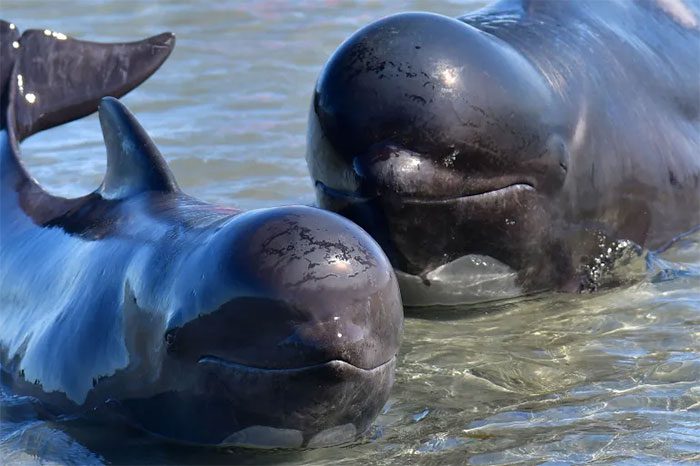Recent research indicates that the sounds generated from mining activities, including noise from remote-controlled vehicles on the ocean floor, coincide with the communication frequency of whales.
The noise from deep-sea mining operations may hinder the communication abilities of whales.
This warning was issued in a study published in the journal Frontiers in Marine Science on February 14.

Pilot whales stranded at Farewell Spit, New Zealand in February 2017. (Photo: AFP/TTXVN).
The study suggests that sounds from mining activities, including noise from remote-controlled vehicles on the ocean floor, overlap with the communication frequencies of whales.
It argues that mining activities can produce noise across various frequencies that may travel hundreds of kilometers, disrupting whales’ ability to use sound for navigation and interrupting the messages they convey through their “songs.”
Previous studies on ocean noise have shown that it negatively impacts whales.
One study found that human-generated noise could increase the risk of humpback whale mothers becoming separated from their calves, as their normal calls are very low-frequency.
Additionally, in the new study, the authors assert that the distant impacts on whales may have been overlooked and not measured, along with the effects on predator species that live near the water’s surface and rely on deep-sea environments, such as sharks.
The authors emphasize the need for further research to assess the risks posed by deep-sea mining activities to marine mammals.
The study has been peer-reviewed by a panel of experts and is funded by the environmental protection organization Umweltstiftung Greenpeace.
The findings come amid increasing efforts by some governments and companies to advance plans for mining metal-rich rocks used in battery production across vast areas of the ocean floor.
An estimated 22-30 whale species, including the endangered blue whale, can be found in the Clarion-Clipperton Zone of the North Pacific, where the International Seabed Authority (ISA) has granted 17 exploration licenses for deep-sea mining.


















































